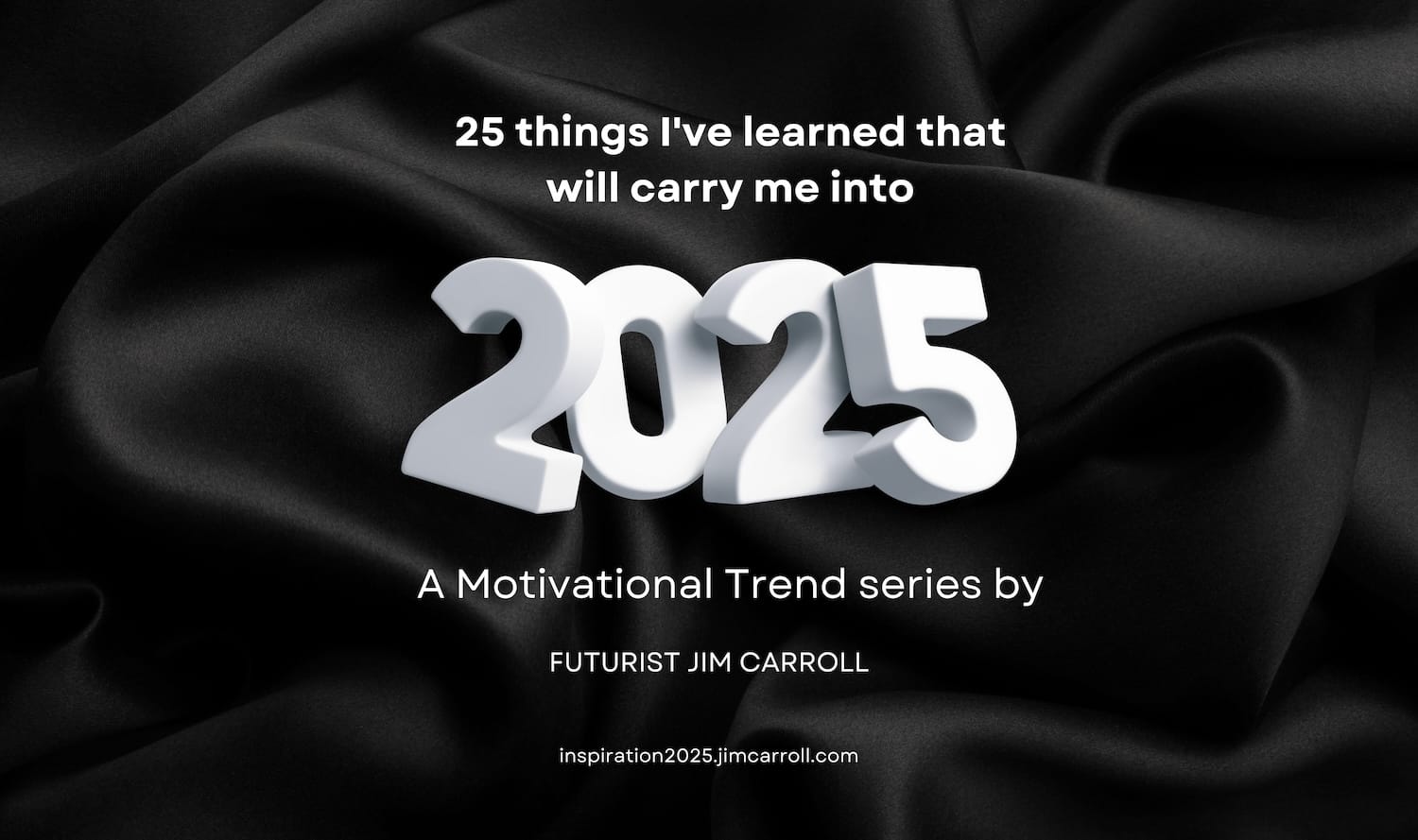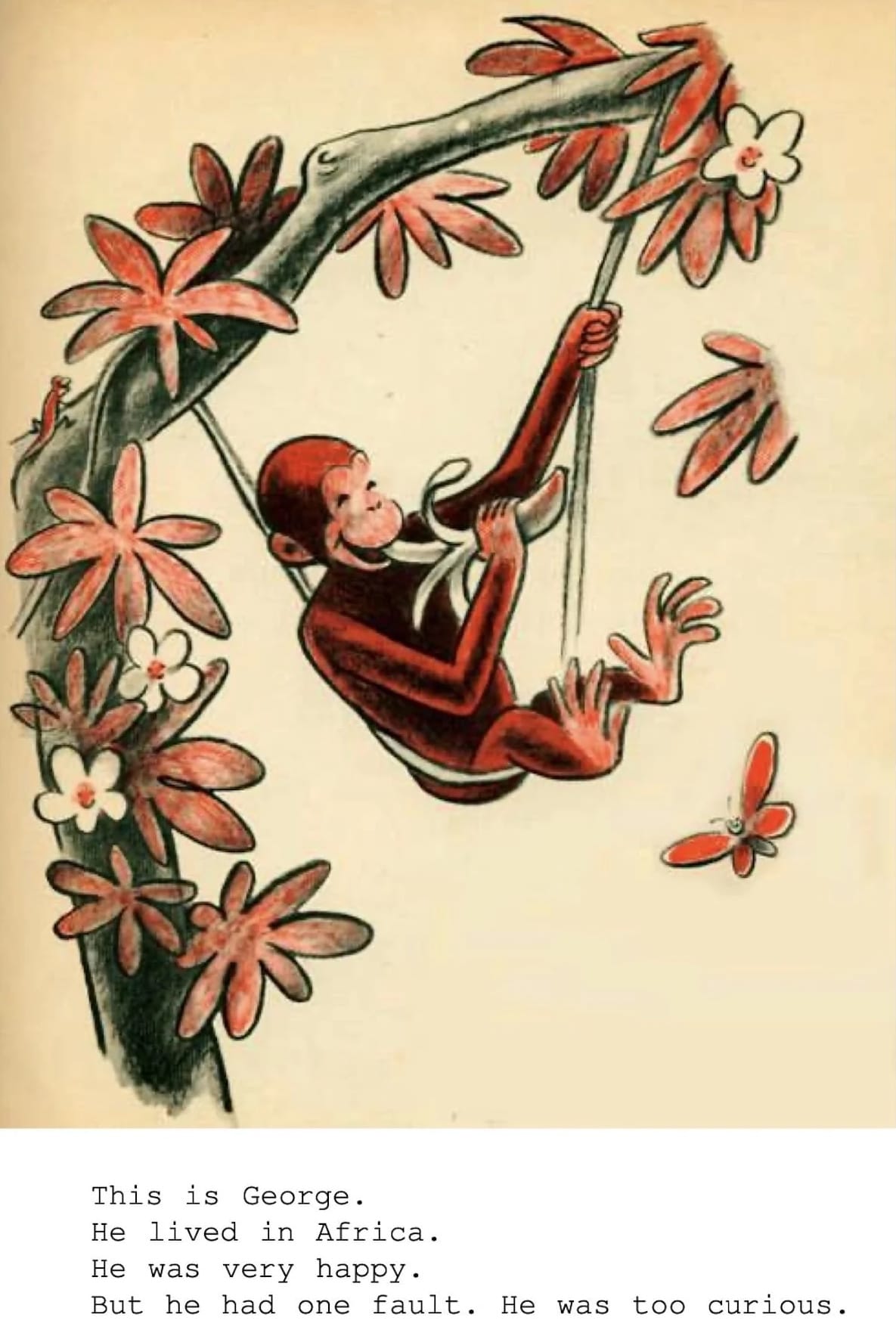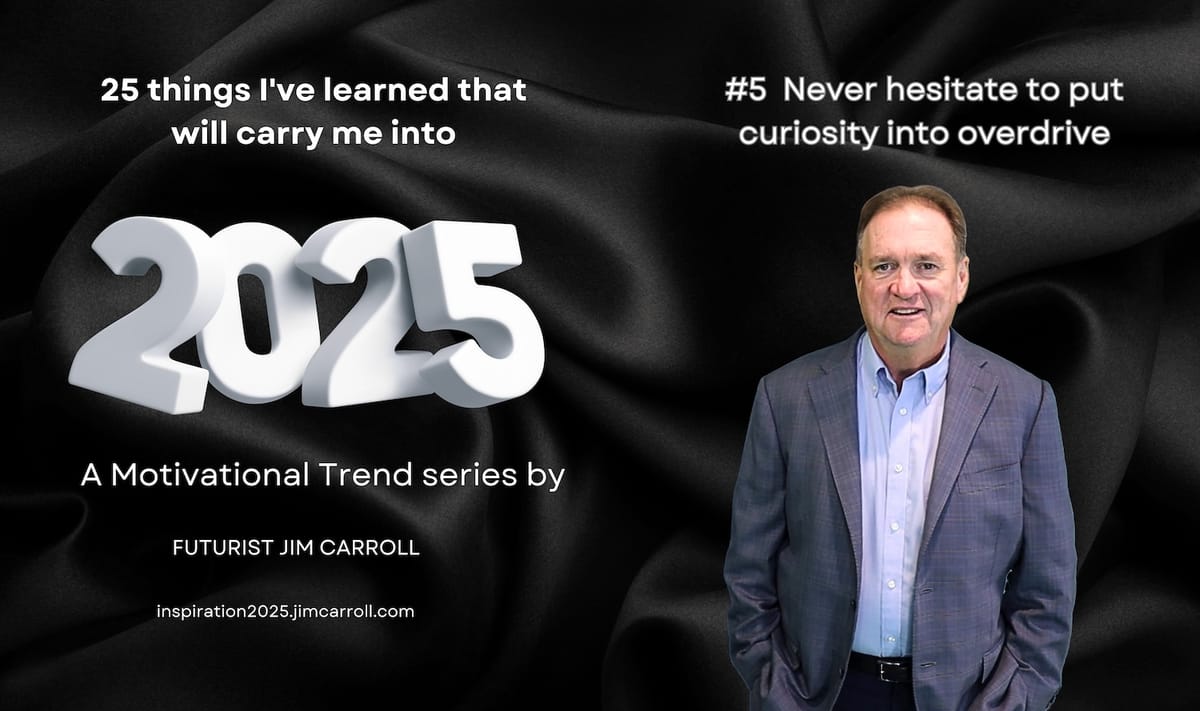"Never hesitate to put curiosity into overdrive" - Futurist Jim Carroll
Futurist Jim Carroll is writing a series, "25 Things I've Learned That Will Carry Me Into 2025." He is putting this together based on his 30-year career as a futurist, trends, and innovation expert, advising leaders of some of the world's most prestigious organizations on how to align to a faster future. He intends for the series to provide valuable guidance to others eager to learn how to move through a year that promises to be volatile, unpredictable, and full of uncertainty. Each day, the post will go out on multiple mailing lists, social media networks, and to the Website https://2025inspiration.jimcarroll.com

Be like Curious George!
More on that in a bit, but first, think about the power that exists within a curious mind. If knowledge is accelerating quickly, science is moving fast, new careers are being invented and everything else is changing at a furious pace, and you want to get ahead - doesn't it make sense to use your creativity to learn more about what's happening?
My theory has always been that a curious mind is a mind that has a healthy relationship with change, an ability to better understand the trends that will define our tomorrow, and a passion to explore new ideas. A curious mind is a sponge for discovery and a vessel for the exploration of new ideas. It's a mind that can take necessary risks and just an overwhelming desire to better understand how to chase success.
A curious mind is a powerful mind - and from that perspective, being curious is the secret weapon we've all been blessed with.
Recognize that reality - and do more of it! That is, chasing your curiosity.
Studies bear this out. A 2016 study in the scientific publication Neuron found that curiosity enhances learning and memory formation by "activating reward-related brain regions and hippocampal areas." In other words, curiosity breeds enjoyment and fuels drive and ambition. Intuitively, that just makes sense. Curiosity has a direct impact on our skills and careers - a Harvard Business School study in 2018 demonstrated that curious employees were 34% better at creative problem-solving, and job performance ratings were 3.1x stronger than people who were not ranked high on the curiosity scale. That had a big impact on their contribution - they were also known for innovative thinking, contributing more than 2 1/2 times the idea that others.
And what about the ability to deal with speed? Another recent study ("Curiosity as a Change Catalyst") by psychologist and curiosity expert Todd Kashdan found that, during a period of organizational change, curious employees learned new systems 42% faster, reported 56% less stress during transitions, were 2.8x more likely to suggest process improvements, and built cross-functional relationships 3x faster., With over 1,200 people involved in the study., that's a pretty resounding commentary on the importance of curiosity.
Hence, curiosity.
So back to Curious George - I know that curiosity has certainly fueled every single aspect of my success over time. And that's why I've always found motivation in the story of Curious George - I've loved it from the very moment I started reading the story to my children! I relayed the story in one of these posts a few years back, and it's worth sharing again.
The series of books caused them to ask lots of questions! Why does he always get into trouble? Why does the man wear a yellow hat? Why can seagulls fly? Why does he do that?
The first paragraph of the first book, though, defines a key character attribute:
This is George.
He lived in Africa.
He was very happy.
But he had one fault. He was too curious.

I take issue with that idea - curiosity should never be defined as a fault!
Indeed, no one should ever be faulted for being too curious, because it is one of the most important attributes of successful innovation and creativity. From that perspective, Curious George should be a role model for the concept of curiosity - it's his inquisitiveness mind that defines him, and within that, he shows several important pathways to creativity:
- with a little bit of curiosity, you can do anything
- meeting someone new can fire up your curiosity engine
- trying new things that you haven't done before often leads to fascinating results
- taking risks is an important part of learning
- creativity is chaotic - always getting in trouble can be a great thing!
- his predictability is only to be found in his unpredictability - serendipity circumstance seems to define him
- experimentation is critical to the exploration of new ideas, even if the results might be uncertain
- it's important to ask lots of questions
These are important leadership skills - the more you ask questions, examine new ideas, find new pathways, explore new ways of doing things, and generally poke around the edges of the future, the better positioned you are to expand your creative horizon. It's precisely the area of your curiosity that you should spend more time on, not less - even if it leads you into good trouble.
Otherwise, you are keeping yourself in the land of the status quo, doing the same old thing, stifling creativity through the slaughter of natural inquisitiveness. Curiosity should be embraced, not denied,
Over the years, I've come to realize that part of the fuel that fires my passion for my work is my intense curiosity - I've also come to realize that thinking differently has become critical to my success! So it is with you; in a time in which business models, markets, customers, industries, and clients are changing at an ever more furious pace, thinking differently about the world around you is a powerful and important personal trait to possess. You also need to ensure that you provide for a culture of creativity within your organization so that it can evolve at a pace that the future demands of it.
Creative organizations fuel a culture of curiosity and encourage their people to look for trends, signs of change, and opportunities everywhere. They know that innovation can come from tension, and that tension can come from people who don't fit the traditional corporate mold - or who get into trouble. They establish a collaborative culture in which information sharing is expressly encouraged. They also know that success comes from embracing change, not shying away from it. Not only that, but they know that true, real, sustainable success can only come from doing things differently, and that this in and of itself requires courage because change involves risk.
So do one thing to fire up your creativity - be more like Curious George!
Futurist Jim Carroll has often shared the story of Curious George in his keynotes.

